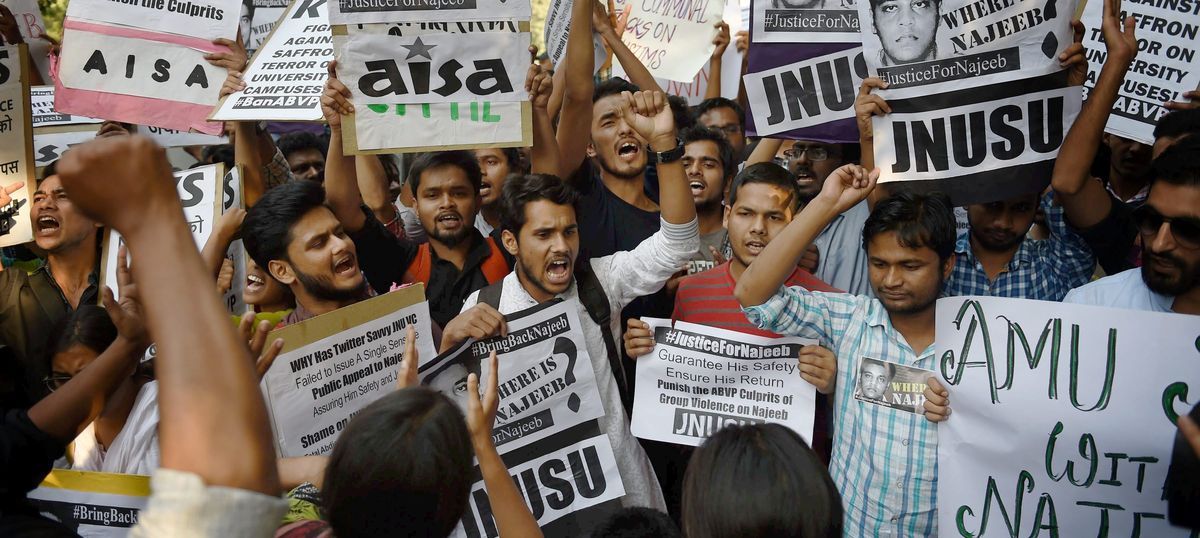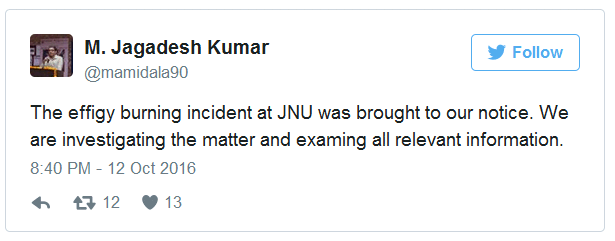The inaction of the police and university authorities is baffling.

It has been more than two weeks since a student – Najeeb Ahmed – disappeared from the campus of Jawaharlal Nehru University in the national capital, following a brutal thrashing and threats at the hands of a group of students belonging to the Akhil Bharatiya Vidyarthi Parishad. The thrashing followed an altercation between Ahmed and an ABVP member, and was witnessed by many including by a hostel warden.
I say it again. A student vanished from a campus in Delhi after a thrashing by members of an organisation linked with the ruling party. This fact in itself is ominous and disturbing. But the response of authorities and media to it is even more ominous and disturbing.
Surely the JNU administration ought at least to initiate action against those who were seen beating up Ahmed? But it has not.
Surely the JNU administration should publicly issue a personal appeal to the missing student, assuring him of safety and due process? Instead its initial response echoed the ABVP narrative and referred to Ahmed as “the accused” in the initial altercation. In its latest bulletin, it has dropped the word “accused”. But this bulletin mentioned only the initial brawl and the allegation that Ahmed slapped a student. The bulletin omits even to acknowledge the severe thrashing of Ahmed by ABVP members in the presence of a warden and many others.
Surely the Delhi Police should have interrogated the students who were witnessed beating up Ahmed before he disappeared (many of these are named in the FIR) and checked the records of their calls and messages?
Surely Ahmed’s disappearance should have been a leading human interest story on all news channels, giving voice to Ahmed’s distraught family and asking hard questions about facts that the JNU administration and Delhi Police are seeking to play down or hide? Barring a few exceptions, the electronic media has ignored the story.
Some questions
A meeting of the warden committee of the concerned hostel on October 16 has recognised that Ahmed was subjected to a brutal assault on October 14 by a group including students as well as outsiders. The questions begging to be asked are:- Why, even after an official body of JNU like the warden committee has taken note of the violence, is the JNU vice chancellor and administration silent on it?
- Why did the JNU administration not file a missing person complaint with the Delhi Police immediately after Ahmed disappeared?
Meanwhile, cynically, a toxic narrative is being crafted on social media and some sections of print media about Ahmed’s disappearance, building an image of him as a dangerous criminal on the run rather than a victim of violence whose disappearance is a cause for profound concern. Dainik Jagran carried a story suggesting mendaciously that JNU activists Umar Khalid and Anirban Bhattacharya (who had been charged with sedition in February) have had a hand in hiding Ahmed.
Double standards
This same JNU administration has been extraordinarily quick in initiating enquiries and action against student activists over democratic protests, which are a long-cherished tradition of the JNU student movement.Take the case of Rama Naga, whom many outside JNU also have come to recognise as the quiet, good-humoured young man who, as the Jawaharlal Nehru University Students Union General Secretary, led the Stand With JNU protests. In July, he was informed by the JNU administration that there was a complaint against him received on May 7, accusing him of “blaring loud music” at the Administration Building on May 1. On September 27, Rama again received a show cause notice from the proctor’s office about the same event, accusing him of organising an event by the Ska Vengers and World Sound Power at which “blaring loud music” had been played. Rama replied, informing the proctor that on May Day, he had been on a hunger strike at the Administrative Building against the punishments meted out to JNU students without due process for the February 9 event. It was not Ska Vengers and World Sound Power, but another band, Delhi Sultanate, that had voluntarily come to show their solidarity on May Day.
He pointed out that ABVP also had had a hunger strike at the same site, where it had a permanent sound system installed and had blared loud songs night and day. How was it that their sound system playing for days on end had not disturbed residents but May Day music played for a few hours had?
Rama received no response, just a summary punishment. On October 21, an office order from the Proctor’s Office declared that an enquiry had found Rama guilty of “organising Ska Vengers and World Sound Power”, and “blaring loud music at night”. The order declared: “This act of Rama Naga is serious in nature, unbecoming of a student of JNU and calls for a strict disciplinary action against him.” However “keeping his career prospects in mind, the Vice Chancellor has taken a somewhat lenient view of the matter”, and so Rama was asked to pay a hefty fine of Rs 5,000, and “warned to be careful and not to get involved in such incidents in future” else “a more stringent disciplinary action will be taken against him”.
The enquiry failed even to get the name of the band right. Farcically, by repeatedly referring to the band as Ska Vengers and World Sound Power, it let slip that its conclusions were pre-scripted.
Effigy burning
On October 4, the JNU administration handed out show cause notices to Rama Naga and three other students – Abdul Matin, Manikanta and Praveen – for “effigy burning of Gujarat Government and Gaurakshaks”.More recently, on October 12, the JNU vice chancellor tweeted about another effigy burning, this time of the prime minister.
This vice chancellor who tweeted promising investigation of an effigy burning of the prime minister, this administration that has imposed hefty fines on students for playing music for a couple of hours on May Day, which has initiated disciplinary action when students burn effigies of gau rakshaks or the Gujarat government, has failed to hand out a single show cause notice or initiate an enquiry or disciplinary action into students who introduced outside elements into a hostel to publicly beat up a student – even after the victim of the beating then disappeared.

The conclusion is inescapable. The JNU administration is making it its job to discipline and punish democratic protests by student activists against BJP governments at the Centre or states or Sangh outfits, while looking the other way even when ABVP members indulge in group violence with dangerous consequences.
ABVP is emboldened
Emboldened by a sense of impunity, ABVP action on campuses is growing.In July, an activist of the All India Students Association at Deshbandhu College in Delhi University, Abhinav Kumar was beaten up by ABVP members so hard that he lost hearing in one ear. Police refused to file an FIR. Later that month, ABVP activists badly beat up a Sikh student at Hyderabad Central University, mistaking him for a Kashmiri student.
In 2015, two activists of Pinjra Tod – a Delhi University-based feminist collective that challenges sexist rules in women’s hostels – got calls from an ABVP member, threatening them with sexual abuse and violence for pasting posters on top of older ABVP posters on DU’s Wall Of Democracy.
More recently, a Night March organised by Pinjra Tod to assert the right of women students to be out on the city streets at night, was attacked by ABVP leaders including former Delhi University Students Union President Satender Awana. Taunting the activists as women of loose morals, they brandished a Rs 100 note to suggest that the activists are sexually available for money.
On October 27, I myself witnessed another such assault by the ABVP, led by no less than the DUSU president at a public meeting organised by AISA on The Idea of a University – a meeting held to demand justice for Najeeb Ahmed and think about the values for which a university should stand.
Surprisingly, the meeting ended on a note of hope – coming from the young woman who had been punched by the ABVP leader. In a five-minute speech to the students who were protesting the police-protected disruption of the event by the ABVP, Kawalpreet Kaur reminded us that the university belonged to everyone – including to those who attacked the public meeting. She expressed the hope that the day would surely come when universities would not be places where hate and violence could make a Ahmed disappear; universities would be places where love would flourish and the free exchange of ideas would thrive.
It is difficult to nourish hope when a student has been missing from a university campus for so long. Najeeb Ahmed’s fellow students did not celebrate Diwali on Sunday – instead, they held a Light of Hope vigil for their friend. Hope lies, perhaps, in raging with all one’s might against the dying light.

Kawalpreet Kaur after being punched in the face.
Kavita Krishnan is Secretary, All India Progressive Women’s Association, a Polit Bureau member of the Communist Party of India (Marxist Leninist) and former joint secretary of the Jawaharlal Nehru University Students Union.
This article was first published on Scroll.in



